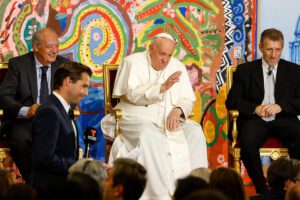VATICAN CITY (CNS) – Pope Francis called the migration crisis between Mexico and the United States a “serious problem” and praised a U.S. bishop working along the border during an interview with Telemundo journalist Julio Vaqueiro.
In the interview, broadcast May 25, the pope was shown photos of a baby wrapped in a blanket and placed inside a suitcase to be taken across the Rio Grande into the United States.

“It’s a serious problem there,” the pope said in response. “On the other side (of the border) there is a great man, Bishop Seitz” of El Paso, Texas.
“This bishop feels (the problem),” Pope Francis said. “The problem of migrants is serious, it’s serious there and it’s serious here,” he said about Europe, particularly “along the Libyan coast.”
Speaking about his own experience as a child of immigrants, and now as an immigrant in Rome, the pope said that every person who leaves his or her homeland “misses the air of their birthplace.”
“The mate you make in a thermos yourself is not the same as the mate your mom or your aunt makes for you,” he said, referring to the caffeinated herbal drink popular in Argentina.
Vaqueiro asked Pope Francis about his meeting May 13 with Ukrainian President Volodymyr Zelenskyy.
The pope said Zelenskyy asked for his help in returning Ukrainian children who have been taken into Russia and told the pope to “not dream much about mediations.”
Since the outbreak of the war, the Vatican has avoided openly condemning the Russian government and has offered itself as a mediator for peace negotiations between Russia and Ukraine.
“Really, Ukraine’s bloc is very strong, it’s all of Europe, the United States, so it has a lot of strength,” Pope Francis said to explain why a Vatican mediation did not appear immediately feasible. “But what really pained (Zelenskyy) and what he asked for collaboration on was trying to get the children back into Ukraine.”
More than 19,000 Ukrainian children have been forcibly deported into Russia or Russian-held territories according to a Ukrainian government website. The U.N. Human Rights Office has classified Russia’s illegal transfer of children into its territories as a war crime.
In response to a question on abortion, Pope Francis said that a fetus is a “living being, I’m not saying a person, but a living being.”
“Is it licit to eliminate a living being to resolve a problem?” he asked. “Is it licit to hire a hitman to resolve a problem?”
On abuse, the pope said that priestly celibacy “has nothing to do” with the sexual abuse of minors by the clergy, since, he said, abuse is committed at high rates within families and schools by married persons too.
Vaqueiro, who served earlier in the evening as master of ceremonies at Pope Francis’ meeting with members of Scholas Occurentes, a Vatican-related educational initiative, asked the pope what still needed to be done to realize the reforms discussed by the cardinals in the lead up to the conclave that elected him pope just over 10 years ago.
“Everything,” Pope Francis said. “It’s curious, as you do things, you realize everything that still needs to be done; it’s something insatiable.”

